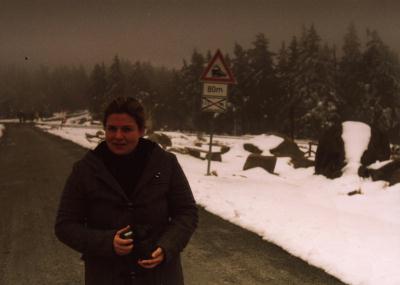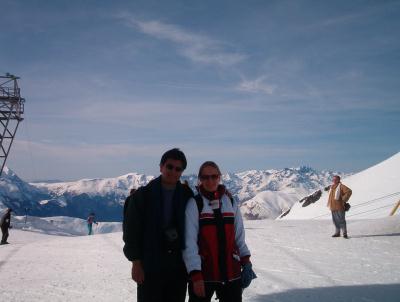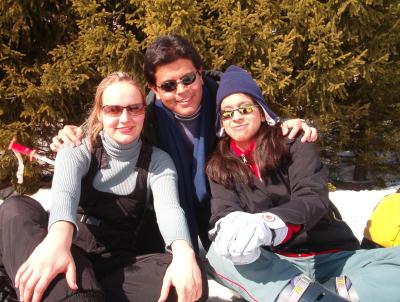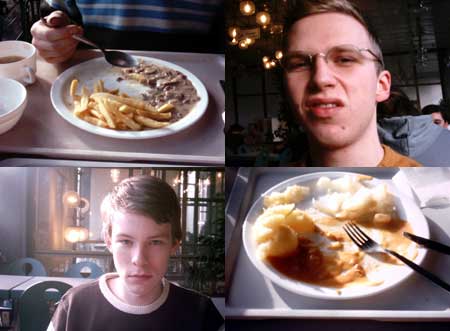Salut, encore en train de chercher un stage, aucune réponse d' arte, ce matin j'ai passé l' examen pour le CUEF et demain je vais commencer avec le cours de la langue. Réalizé, qu' il y a des problèmes avec le grammaire, je peux parler et comprend tout, mais c'est doit etre meilleur, je ne suis pas satisfait...il fait chaud à Grenoble, le week-end dernier mes parents sont venus me voir, c'était bon, mais dans les restaurants c'est pas facile de choisir quelquechose, normalement je mange un kebap ou cuisine dans la résidence, mais avec des parents ;-) ohlala
Hier j'ai regardé "Frida" au cine, une femme très interessante, je veux savoir plus sur elle, est-ce qu'il y a quelqun qui me peut proposer un livre sur Frida Kahlo??
Le week-end prochain, Alexandros et moi, nous voulons louer une voiture pour alles avec des amis au region rhone-alpes...
A Hanovre, les études recommencent, et c'est un peu bizarre de pas etre là pour l'été, on va voir.
A plus, sabine
… link
Hi Robert, da haste also keine lust gehabt auf ostern en famille. Hastes gut ueberstanden?? Hier ist es sommerlich warm, eigentlich haette ich einen Kurs, aber keiner war da, vielleich ist er heute ausgefallen, das Zimmer hat gewechselt und keiner weiss was...nicht mal die Sekretaerin, das macht mich ein wenig unenstpannt. Schliesslich will ich da die Klausur Ende Mai mitschreiben. Meine Schwester war bis gestern mit Micha zu Besuch und wir sind viel rumgefahren: Chambery, Chartreuse und Vercors. Im Moment ueberlege ich, was ich hier alles noch machen will und ich nicht vielleicht versuchen koennte, ein Praktikum hier zu machen, steht aber alles noch in den Kinderschuhen, hab noch nicht mal nen Lebenslauf auf franzoesisch. Die Zeit rast und ich will gar nicht richtig zurueck, ich habe so viele neue Leute kennengelernt und auf Dinge verzichtet, dabei habe ich letztlich gemerkt, dass es gar nicht so schwierig ist darauf zu verzichten. Lieber Robert, ich hoffe mal die Uni frisst dich nicht auf und du hattest und hast auch ein paar freie Tage.
Knutsch, sab
… link
Wir waren vorige Woche auf de mBrocken, und da lag noch ca. 30cm Schnee, und uns wars enorm kalt... 
… link
regen tropft seit tagen, die hauptstadt wartet morgen auf mich...8 Uhr TGV und in drei Stunden bin ich da.
Quelquefois, je parle tout le temps anglais, ca se bete...Habe gestern eine Synthese auf franzoesisch geschrieben: sur le rôle de l'art moderne dans la société contemporaine. Es wird schon noch ne Weile dauern, bis ich fluessig schreiben kann. Monsieur Guichard meinte, es waere gut, dass ich so wenig geschrieben habe, sei ja auch der sinn einer Synthese. Le Mardi prochaine, je fais une exposé sur des stereotypes allemands et sur Allemagne en général. Ce soir, comme toutes les jeudis, il y a un cours de salsa au loco mosquito, weiss noch nicht, ob ich gehe, da ich ja morgen zeitig raus muss.
… link
Ich habe gerade mein Vordiplom mit 2 bestanden, Feldbrocken fallen von meinen Füßen Richtung Zenit und umgekehrt.
Gruß aus dem von Hagelschauern geplagten Weimar, Robert
… link

… link
Hi!
Ich habe gerade meine Prüfungsthemen erfahren! Mediale Systeme, Analysis, Fuzzy und Unscharfe Systeme und Konkurrente Systeme! Die nächsten 3 Wochen werden dann richtig toll, und am 2.April habe ich Prüfung. Ich hoffe du nimmst es mir nicht krumm, wenn ich bis hierhin und in nächster Zeit dem Forum hier nicht allzu viel Kontributivität zuteil werden lassen kann. Danach wirds hoffentlich besser!
Bis später, Robert
… link
hallo ihrs,
ja, langsam is es a bissel langweilig, ich habe das gefuehl...dass ich einen einsamen monolog mit mir fuehre...dann wird mein weblogg jetzt eben das, was es schon immer urspruenglich sein sollte...ein tagebuch. Habe einige fotos reingestellt...ich war wieder skifahren, hoho und ich habe es selbst nicht geglaubt, es macht mir langsam spass...davor war ich schlittschuh laufen, ja, binchen wird sportlich. Jetzt sehe ich wie ein Depp aus, ich habe naemlich ein feuerrotes Gesicht und man sieht den Abdruck meiner Sonnenbrille. Beim naechsten mal werde ich wohl ans eincremen denken.




… link
grenoble, die sonne brennt. Ich glaube, ich werde fruehjahrsmuede...bin mit dem dollen wetter erst mal voellig ueberfordert. Es nervt, ich habe hier nur 30 Minuten, um ins Netz zu huepfen und neben mir stehen schon wartend asiatische maedchen, die auf meinen computerplatz heiss sind...mal sehen, wie lange sie braucht um mich von meinem platz zu vertreiben...Jetzt hatten wir blickkontakt, mist. Ich bin weg. Bine
… link
Ca va? Depuis und semaine j` ai mal a la gorge, aux amygdales. Ich habe also seit einer Woche fette Mandeln und war heute beim Unigesundheitszentrum, um einen arzttermin fuer donnerstag zu bekommen. Ich habe mir ueberlegt, da ja auf dieser site nicht so viel passiert, wir mal ratschlaege austauschen koennten. Ich braeuchte als erstes einen tipp: Was hilft beim Einschlafen...bitte nicht so Sachen, wie selbstbefriedigung, das kennen wir alles schon. Meine zweite frage: wie wuerde ich erkennen, dass ich mumps habe und was ist das ganze. Ich gehe jetzt gleich in ein irish pub>>>danke an alle schmerzmittel der welt. knutscher, sab
… link
folgender link ist nicht uninteressant: www.heise.de
… link
Hallo ihrs,
ich glaube, es wird so, wie der Herr Engelmann gesagt hat...ich bin hier zum Spass haben. Meist ist es naemlich so: sobald ich meinen Fuss aus meinem Zimmer packe und Richtung Gemeinschaftskueche wandere und da Gabi, Gabriell oder beispielsweise Raul sitzen, sind sie schon wieder aufm Sprung in eine Kneipe und fragen mich, ob ich mit will. Ich sag natuerlich nicht nein und so waren wir gestern im loco moskito: en francais: le fou moustique...auf deutsch die bekloppte muecke. Ihr koennt euch nicht vorstellen; wie voll es da war... die kneipe war schon an der tuer so kloppe voll, dass ein normalsterblicher nie reingegangen waere, aber fuer uns, so 10 Leute...kein Hinderniss. Ich habe so was noch nie erlebt; aber es geht, irgendwann standen wir an einem tisch und haben getanzt, indem wir mit dem kopf gewackelt haben Ich gehe jetzt in einen kurs....kuesse an alle sab
… link

… link
si on dit chez toi qu'il pleut comme des vaches pissent il faudra dire chez nous qu'il neige comme des vaches chiennent :-)
excuse-moi chérie
… link
Hallo Diana, bist du? Siehste, mit so nem Weblogg lockt man dich ja ganz schnell ausm Ofen vor. :-) Bin hier grade noch am rumprobieren, wo dann wie welcher Beitrag erscheint. Was macht eigentlich deine Ausbildung und überhaupt? Grüßchen
… link
Huhu, liebes Weblogg, hier spricht deine Gebieterin. Auf gute Zusammenarbeit.
… link
… link
Michel Serres
Michel Serres is a 'voyager' between the arts and the sciences, and a thinker for whom voyaging is invention. Invention is also called 'translation', 'communication', and 'metaphor'. By way of introduction to Serres's simultaneously philosophical, scientific and poetic work, we refer to a nodal event in the history of science: thermodynamics, and the consequent transcending of the closed system of Newtonian mechanics. To transcend the closed system is, for Serres, to fuel invention.
In 1824, a French army engineer, Sadi Carnot drew attention to the fact that in the steam-engine heat flowed from a high-temperature region (the boiler) to a low-temperature region (the condenser). Although Carnot incorrectly concluded that no energy was lost from the system, he did appreciate that the more efficient the system, the less the energy required for its operation, and that it was the difference in the temperature between the boiler and the condenser which produced energy. Carnot's work ended prematurely when he died at the age of 36. A number of people like Hermann Helmholtz and Rudolph Clausius in Germany, and William Thompson (Lord Kelvin), in Glasgow, further developed Carnot's work, with the result that in 1865, Clausius coined the term 'entropy' for the heat lost from any mechanical system. The era of thermodynamics had arrived. Its first and second laws are, respectively, that 'The energy of the world remains constant', and that 'The entropy of the world tends to a maximum.’ Entropy is also the tendency towards disorder in a system.
Of interest here with respect to Serres is the difference between a simple mechanical notion of energy, and that of thermodynamics. In Newton's mechanical model, no energy in principle is lost from the system: the mechanics of the system are reversible. There are in principle no chance effects. 'According to the second law of thermodynamics. . . the unidirectional motion of [a] projectile would be continuously transformed by the frictional resistance of the air into heat, that is, into random, disorderly motions of the molecules of the air and the projectile’.
This randomness or disorder - as in the unstable borders of a cloud, or in the effects of steam, or in the movement of the tides is only now being taken in charge by chaos theory. Prior to this, stochastics - the theory of randomness - like the theory of probability developed principles aimed at explaining disorderly phenomena.
From this brief outline we note that a Newtonian mechanical system is a system of reversibility: time in it is reversible. With the thermodynamic system, contingency and chance predominate, making it a system of irreversible time. To give a sociological twist to this, we can note that Bourdieu has called the logic of practice the logic of irreversible time.
Serres is ostensibly a philosopher of science. But unlike even his mentor, Gaston Bachelard, he has never accepted that any particular science - let alone natural science conforms to the positivist determination of a hermetic and homogeneous field of enquiry. In a recent work, Serres has indicated that the shape and nature of knowledge more closely approximates the figure of the harlequin: a composite figure that always has another costume underneath the one removed. The harlequin is a hybrid, hermaphrodite, mongrel figure, a mixture of diverse elements, a challenge to homogeneity, just as chance in thermodynamics opens up the energy system and prevents it from imploding.
Michel Serres was born in 1930 at Agen in France. In 1949, he went to naval college and subsequently, in 1952, to the Ecole Normale Supérieure (rue d'Ulm). In 1955, he obtained an agrégation in philosophy, and from 1956 to 1958 he served on a variety of ships as a marine officer for the French national maritime service. His vocation of voyaging is therefore of more than academic import. In 1968, Serres gained a doctorate for a thesis on Leibniz's philosophy. During the 1960s he taught with Michel Foucault at the Universities of Clermont-Ferrand and Vincennes and was later appointed to a chair in the history of science at the Sorbonne, where he still teaches. Serres has also been a full professor at Stanford University since 1984, and he was elected to the French Academy in 1990.
With the recognition of the interrelation between different sciences and different forms of knowledge, as well as between science and different artistic practices, has come Serres's effort to plot the way that different knowledge domains interpenetrate. Even more: Serres has set himself the task of being a means of communication (a medium) between the sciences and the arts - the Hermes of modern scholarships. With the advent of information science, a new figure for representing science becomes possible: this is the 'model' of communication. Accordingly, we have three elements: a message, a channel for transmitting it, and the noise, or interference, that accompanies the transmission. Noise calls for decipherment; it makes a reading of the message more difficult. And yet without it, there would be no message. There is, in short, no message without resistance. What Serres initially finds intriguing about noise (rather than the message) is that it opens up such a fertile avenue of reflection. Instead of remaining pure noise, the latter becomes a means of transport. Thus in the first volume of the Hermes series noise is analysed as the third, empirical element of the message. Ideally, communication must be separated from noise. Noise is what is not communicated; it is just there as a kind of chaos, as the empirical third element of the message, the accidental part, the part of difference that is excluded. Every formalism (mathematics, for example) is founded on the exclusion of the third element of noise. Every formalism is a way of moving from one region of knowledge to another. To communicate is to move within a class of objects that have the same form. Form has to be extracted from the cacophony of noise; form (communication) is the exclusion of noise, an escape from the domain of the empirical.
In his book, The Parasite, Serres recalls that 'parasite' also means noise (in French). A parasite is a noise in a channel. And so when describing the rats' meals in a story from the fables of La Fontaine - the meals of two parasites - Serres also refers to noise: 'The two companions scurry off when they hear a noise at the door. It was only a noise, but it was also a message, a bit of information producing panic: an interruption, a corruption, a rupture of information. Was this noise really a message? Wasn't it, rather, static, a parasite?
Serres addresses the theme of noise and communication to show that 'noise is part of communication'; it cannot be eliminated from the system. Noise in language as in other systems of communication has its equivalent in the very notion of system itself. For, 'we know no system that functions perfectly, that is to say, without losses, flights, wear and tear, errors, accidents, opacity - a system whose return is one for one'.
Serres's interest in 'noise' as the empirical third excluded element in human existence has led him to translate (traduire) between apparently heterogeneous domains in an effort to forge 'passages' (e.g., northwest passage) between them - passages not just of communication, but also of non-communication, and static. At one point in his intellectual trajectory, the notion of structure seemed to serve the purposes of translation - and therefore, transport very well. Indeed, Serres characterises the structuralist method as a method in the ,etymological sense: that is to say, a mode of transfer'. Beginning as part of Serres's mathematical training in algebra and topology, structure is brought to the human sciences where a structural analysis,
examines one or two particular models reduced to a form (or to several): a pre-established, transitive order. Then, analogically, it finds this form or structure in other domains, et similia tam facilia. Whence its power of comprehension, of classification and of explication: geometry, arithmetic, mechanics, method, philosophy.
Influenced less by Saussure, than by the Bourbaki group of mathematicians, Serres finds in structural analysis a means of travelling between different domains, and even between different realities. Structural analysis inevitably leads to comparison, and this is why Serres has great respect for Georges Dumézil's work; for Dumézil was able to show, through a comparison of sets of relations, that Indo-European mythology has the same structure, despite the variety of contents. In a very precise formulation Serres says: 'with a given cultural content, whether this be God, a table or a washbasin, an analysis is structural (and is only structural) when it makes this content appear as a model’ - a structural model being defined as 'the formal analogon of all the concrete models that it organises'. Rather than 'structural analysis', Serres proposes the term, 'loganalyse'.
Through its non-referential and comparativist approach to place (no single place constitutes the object of structural analysis), the structuralist place is both 'here and there' at the same time. It is a highly mobile site that is constituted through an enunciation. There is no fixed point, here and now, but a multiplicity of spaces and of times. This implies, too, that there is no punctual empirical, subject, but rather a subject as a discontinuous virtuality.
Serres's more recent work has emphasised the importance to him of poetry and the effect of new technologies (such as information technology) on everyday life. Poetry, in a sense, is the noise of science. Without poetry there would be no science. Without science - or at least philosophy - there can be no poeticising and fictionalising. Serres's reading of Jules Verne, Emile Zola, and the paintings of Turner serve to confirm this point. In Verne, for example, the meaning of coming to grips with non-knowledge is demonstrated. Non-knowledge is the mystery - the noise, we could now say necessary to the constitution of knowledge as such. Non-knowledge in Verne is the unknown that one must venture into in order to constitute knowledge. The unknown is composed of worlds for which there would be as yet no concept or language. With Zola and Turner, the principle of stochastics is illustrated by their artistic endeavour in presenting steam, smoke, water and a variety of indeterminate phenomena.
For Serres, 'the perception of stochastics replac[ing] the specification of form' is a breakthrough in linking the sciences. For science is a system, just as poetry is a system. Rain, sun, ice, steam, fire, turbulence - they all engender chance effects. Modern physics begins here with the realization that turbulence prevents the implosion of systems. The ‘outside' of the system is what prevents implosion.
'What exists', says Serres, 'is the most probable' (i.e. disorder, chance, and the exception). The real is not rational. 'There is only science of the exception, of the rare, and of the miracle' (i.e. of law, order, rule). System in the Classical Age is an equilibrium; in the nineteenth century it is thermodynamics and meteorology becomes a metaphor for knowledge.
In The Parasite, Serres asks whether system is a prior set of constraints, or whether, on the other hand, system is the regularity manifest in the various attempts to constitute a system. 'Do these attempts themselves constitute the system?' Serres asks. Noise, we have seen is the system. 'In the system, noise and message exchange roles according to the position of the observer and the action of the actor.' Noise is a joker necessary to the system. It can take on any value, and is thus unpredictable so that the system is never stable. Instead, it is non-knowledge. Systems work because they do not work. Dysfunctioning remains essential for functioning. The model, then, is free of parasites, free of static (as in mathematics), while the system is always infected with parasites which give it its irreversible character. The system is a Turner painting. With his representation of the chance effects of clouds, rain, sea, and fog, Turner interprets the second law of thermodynamics - the law made possible by Carnot. Turner translates Carnot. Such is Serres's poetic insight.
Two figures, then, inform Serres's oeuvre: Hermes and the Harlequin. Hermes the traveller and the medium allows for the movement in and between diverse regions of social life. The Harlequin is a multicolored clown standing in the place of the chaos of life. Two regions of particular interest to the voyager in knowledge are those of the natural sciences and the humanities. Should science really be opened up to poetry and art, or is this simply an idiosyncrasy on Serres's part? Is this his gimmick? The answer is that Serres firmly believes that the very viability and vitality of science depends on the degree to which it is open to its poetical other. Science only moves on if it receives an infusion of something out of the blue, something unpredictable and miraculous. The poetic impulse is the life-blood of natural science, not its nemesis. Poetry is the way of the voyager open to the unexpected and always prepared to make unexpected links between places and things. The form that these links take is of course influenced by technological developments; information technology transforms the senses, for example.
Serres's writing is a challenge for good reason. In his view, not to stimulate the reader to find the coherence in his work - as he has done with others - is to render it sterile and subject to the collapse that inevitably awaits all closed systems. In the history of physics Serres has argued that Lucretius anticipates the framework of modern physics. De rerum natura (On the Nature of Things) has conventionally been treated as a piece of poetic writing that has little relevance to modern science. But, Serres argues, clearly, turbulence of all kinds is fundamental to Lucretius's system. With the idea of the clinamen - of infinite variation in the course of an object's trajectory - Lucretius anticipates the theory of disorder - entropy - of modern physics. More than this, though, Serres endeavours to show that a mathematics can be produced in light of Lucretius's writings of the last century before Christ.
By extension, the history of science itself is subject to turbulence: it is subject to chance connections of all kinds being made between various domains. Against the rigid orderliness of convention, Serres proposes the relative disorder of poetry, that is, of the miracle, chance and the exception. In its own way, Serres's writing is a glimpse of this miracle of poetry in an island of order.
… link
Aufsatz über Merleau-Pontys "Das Sichtbare und das Unsichtbare" Ontologien, Wissenschaftskritik
Ansätze zu einer neuen Ontologie in Maurice Merleau-Pontys "Das Sichtbare und das Unsichtbare"
… link
Ich halte diese Zusammenstellung im Hinblick auf das Erkennen der vollen Tragweite der Begriffe Deleuzes und Guattaris für sehr wichtig:
frz. mineur:
- klein
- mini
- minder
- gering
- niedrig
- Moll
- mollig
- mickrig
- minoritär
- minderwertig
- minderjährig
- unmündig
- schwachsinnig
- zweitrangig
- Untergebener
- Bergarbeiter
- Pionier
- Minenleger
Quelle: Gilles Deleuze: Kleine Schriften. Berlin: Merve 1980. hintere Umschlagseite
… link
ich habe heute folgendes schöne zitat theodor w. adornos über hobbies gefunden:
"Ich habe kein hobby. Nicht dass ich ein Arbeitstier wäre, was nichts anderes mit sich anzufangen wüsste, als sich anzustrengen und zu tun, was es tun muss. Aber mit dem, womit ich mich außerhalb meines offiziellen Berufes abgebe, ist es mir, ohne alle Ausnahme, so ernst, dass mich die Vorstellung, es handele sich um hobbies, also um Beschäftigungen, in die ich mich sinnlos vernarrt habe, nur um Zeit totzuschlagen, schockierte, hätte nicht meine Erfahrung gegen Manifestationen von Barbarei, die zur Selbstverständlichkeit geworden sind, mich abgehärtet."
gefällt mir ausnehmend gut
… link

